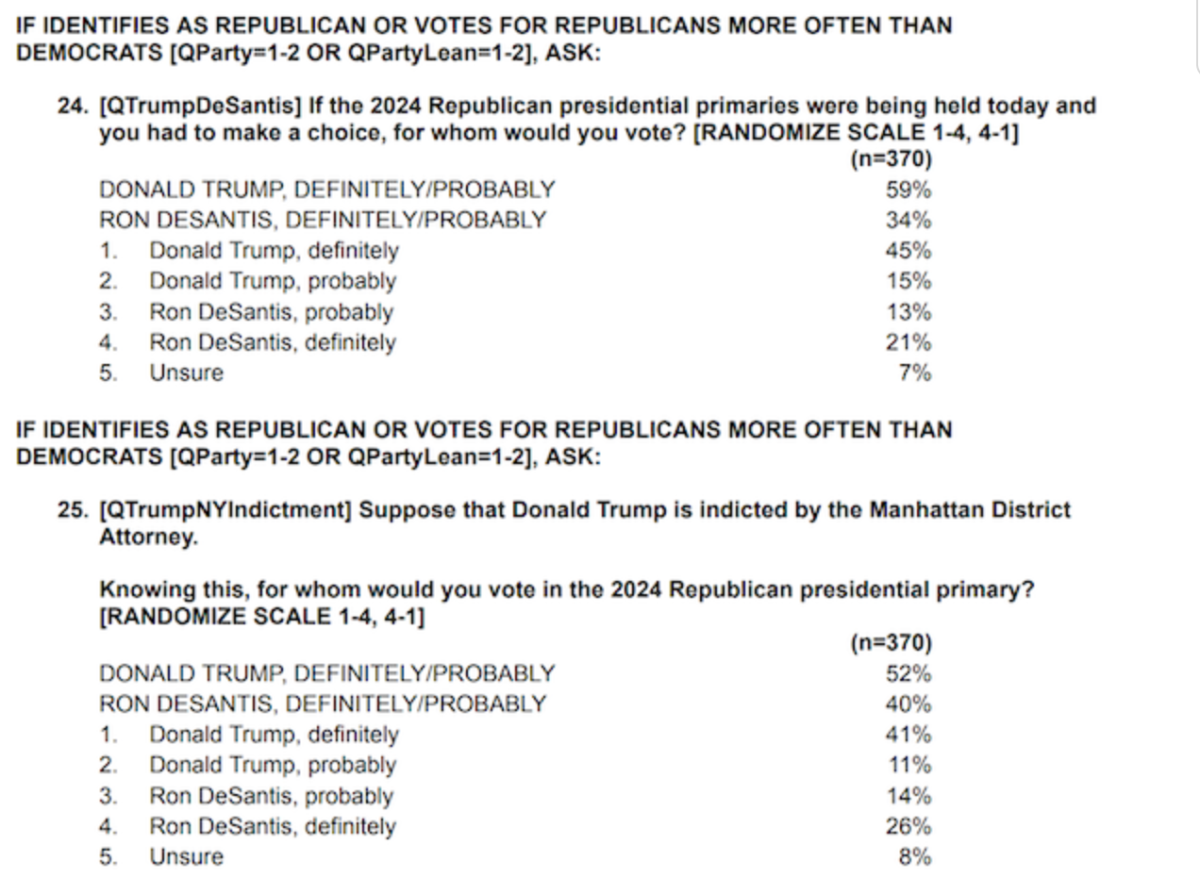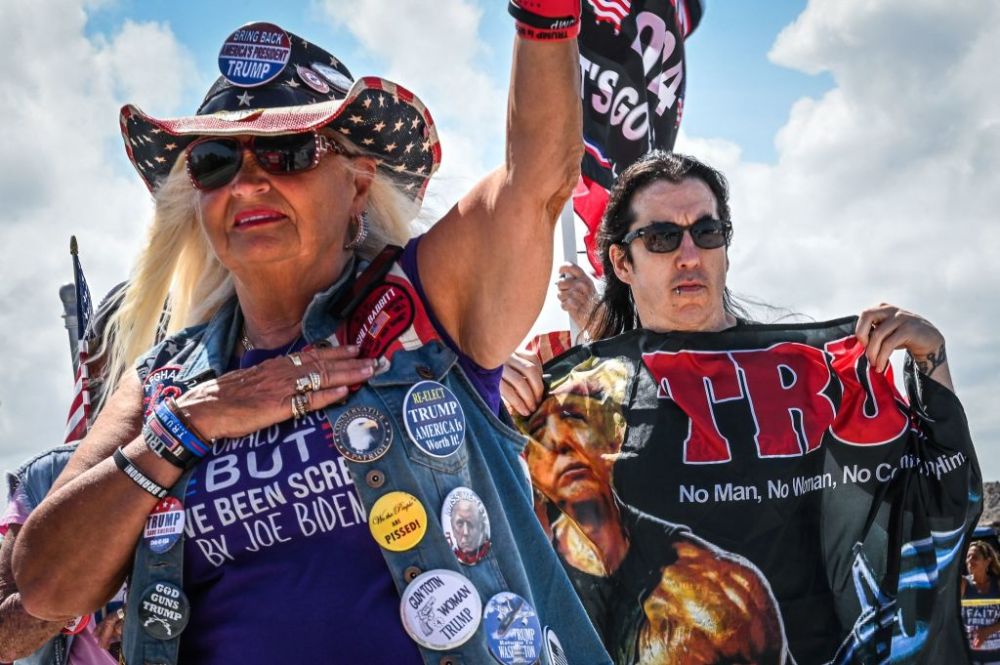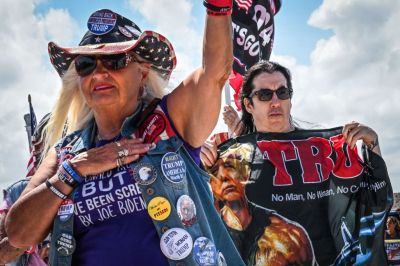Whenever America endures some new episode of Trump-related degradation, I return to Kevin Williamson’s post at National Review the day Trump clinched the Republican nomination in 2016: “Remember, You Asked for This.”
Given how many occasions I’ve had to revisit it, you would think I’d have it memorized.
“Americans and Republicans, remember: You asked for this,” Kevin wrote. “Given the choice between a dozen solid conservatives and one Clinton-supporting con artist and game-show host, you chose the con artist. You chose him freely. Nobody made you do it.”
Part of me wants to end this newsletter right there, as that should suffice as a reaction to yesterday’s news.
Williamson couldn’t have foreseen the particulars of what Republicans “asked for” by nominating Trump, but he recognized that degradation was inevitable. Sometimes that degradation might take the form of a coup attempt, other times it might take the form of paying off a mistress referred to as “Horse Face” and covering up the transactions with fraudulent recordkeeping. No one could know what Trump-rot would look like precisely, but that there would be rot—lots of it, great and small—was foreseeable. And was foreseen.
We asked for it.
The tawdriness of the matter for which Trump was indicted in Manhattan is true to who he is but unequal to what makes him repellent as a political leader. Even the now-standard comparison to indicting Al Capone for tax evasion doesn’t sit right. The average Joe understands why tax evasion is a crime, and why trying to overturn a national election should be one. Why fibbing about secret payments to a porn star in financial disclosures should be one as well, and one so sufficiently grave as to warrant the indictment of a former president, is beyond the ken of most.
And so no one is satisfied with today’s news. The left is superficially gleeful at seeing Trump face a modicum of legal accountability, but look below the surface and you’ll find them worried about the weakness of the case against him and anxious that he might benefit politically from his latest passion play.
The right, meanwhile, is the right.
I’ve written three columns about the prospect of a Trump indictment (possibly more, as they all tend to blur together when one writes every day) and have no single point to make at length beyond those. The occasion doesn’t call for analysis, frankly, it calls for reflection on the disgrace the American right should but doesn’t feel for having elevated a “lowlife from Queens,” in George Will’s apt description, to such an exalted position in civic life. “Too many Americans will focus on whether he committed an actual crime instead of coming to their senses and realizing that in any functional and healthy democracy, someone like Trump would have been shamed and forced into political and social exile years ago,” Tom Nichols observed in The Atlantic.
There’s really nothing else to say. But since something else must be said, let’s concern ourselves with a few shorter reactions to what happened and what’s to come.
1. This really is the worst possible legal and political posture for prosecuting Trump.
If ever there were a moment to expect our two parties to divide neatly on the merits of a questionable public act, the criminal prosecution of Donald J. Trump is it.
But the divisions aren’t so neat. The case that Manhattan District Attorney Alvin Bragg seems poised to prosecute is so weak that prominent liberals have begun to voice their misgivings about it.
“Bragg is doing a lot of legal contortions to make this a felony,” writes Elie Mystal with understatement at The Nation. He worries, rightly, that the charges have been filed too late, that the argument that Trump is guilty of a felony is procedurally dubious, and that Trump is unlikely to face jail time even if convicted. Jonathan Chait went further in his column today at New York magazine, describing Bragg’s decision to charge Trump on the known facts as “bordering on negligent” and “smelling of an effort to find a crime.”
Bad enough for Bragg that influential leftists can’t get excited about his case. Worse still that the public is also sour on it, believing by a 30-point margin that it’s motivated by politics more so than law. Worst of all, though, is that members of his own office have begun whispering to the media that there’s no “there” there.
The indictment that Manhattan District Attorney Alvin Bragg is currently seeking against former President Donald Trump—over his payment to silence a porn star about their sexual affair—is based on a crime that was so flimsy it was never viewed as a standalone criminal case, according to three attorneys who have worked on that investigation.
…
“The Stormy case was the easiest, the most straightforward, but had the risk of being nothing more than a misdemeanor. The business fraud case had more heft, but was complex and sprawling, and much more difficult. There was never any discussion of breaking them apart,” one source told The Daily Beast.
Convicting Trump of a felony in New York requires showing that the fraudulent records he created to disguise his hush-money payments to Stormy Daniels involved a second crime, violating the federal cap on campaign contributions. But Trump was never prosecuted for that offense. Where, then, is the second crime?
Compounding the seeming injustice of the charges is how it diverges from Bragg’s normal tendency to undercharge offenders in Manhattan. In his first week on the job, he instructed his deputies to avoid seeking jail time except for the most serious crimes. (He later retreated.) As a progressive, he’s sensitive to how American criminal law can be unfairly stacked against defendants. Except, it seems, in one particular case.
Why, some progressives will even tell you that the burden is on Trump to prove his innocence at his coming trial, not on Bragg to prove his guilt.
If you’re a right-wing populist inclined to believe that prosecuting Trump can only be understood as a product of left-wing bias, numerous leftists are eager to prove you correct.
2. The Republican establishment remains a terrified captive of the Republican base.
Every right-wing politician and media figure in the United States has reacted publicly to Trump’s indictment in the past 24 hours. Despite the fact that the indictment remains under seal, exactly two to my knowledge have withheld judgment that this is anything less than a witch hunt or declaration of civil war. Take a bow, Asa Hutchinson and Don Bacon.
The all-but-certain truth is that professional Republicans are quietly gratified to see a man whom they despise face any sort of consequence for his actions. For eight years they’ve quavered before him, powerless to expunge him from American politics and hopeful that some arm of law enforcement will do it for them. Now Alvin Bragg has taken his shot, flimsy charges or not.
Maggie Haberman of the New York Times told CNN last night that numerous people who worked for Trump at his company have contacted her in the last few days to express their joy at the thought of him being indicted. (“Wonderful news!” one texted her.) The moment has the exuberant feel of a dictator suddenly facing an internal threat. When you spend decades fearing a ruthless bully who’s behaved with impunity, there’s no thrill quite like seeing him made to answer for his actions at last.
But no one with any interest in holding power in the Republican Party or monetizing its base will admit this, of course.
Fox News’ programming on news of the indictment last night called to mind its 2020 “Stop the Steal” propaganda. Whether or not the people onscreen believed what they were saying, they understood with laser clarity what the moment required of them to remain in the good graces of the people on whom their livelihoods depend. Mark Levin accused Democrats of having “done the final thing that you do when you put the nail in the coffin of a republic” and urged Republicans to “circle the wagons.” Glenn Beck donned a red MAGA hat, proclaimed that Democrats have “wanted violence from the right from the beginning,” and predicted that America will be a “virtual police state” within two years. Jesse Watters said darkly of the indictment that “I’m angry about it. I don’t like it. The country’s not gonna stand for it. And people better be careful.”
If you work in conservative media, you’re forever mindful of the fact that if you don’t share the populist base’s grievance du jour, the guy behind you in the ratings surely will. That’s how we ended up with Fox News pushing conspiracy theories about Dominion Voting Systems after Newsmax began creeping up in the ratings. And it’s how we’ve ended up with various right-wing personalities half-warning-about and half-threatening a new insurrection if Trump is indicted. Last week even one of the more mild-mannered Republicans in Congress, Marco Rubio, exclaimed that prosecuting Trump “would shred the country, rip it at its seams.”
When I read that, it reminded me of how Islamist groups would react 20 years ago whenever Hamas blew up a bus in Israel. Hamas would take credit for the murder, of course, but Islamist groups with aspirations of political legitimacy like the Muslim Brotherhood had to remain formally opposed to violence. “We do not condone today’s attack,” they would announce, “but you must understand the legitimate grievances that inspire such actions.”
That’s the role Marco and the rest of the “respectable” Republican establishment now find themselves in. They’re terrified of how feral their own base has become under Trump’s leadership but they’re also terrified of losing their political influence by alienating that base. So they’re stuck, Islamist-style, formally denouncing violence on the one hand while providing political cover for their side’s most violent excesses on the other: You must understand the legitimate grievances.
There will be much more of it to come.
3. We’re about to see Trump cultism like we’ve never seen it before.
Well, maybe once before.
Both parties in my lifetime have rallied around leaders who got into legal trouble by lying about sex, but they haven’t rallied the same way. When Bill Clinton got caught lying about his indiscretions, Democrats insisted it was much ado about nothing. It was a private matter, not a proper subject of government scrutiny. It was no one’s business except Hillary Clinton’s. It was irrelevant.
That’s not the line right-wing populists have taken toward Trump’s indiscretion with Stormy Daniels. Republican voters aren’t dismissing Trump’s lies as irrelevant. They’re valorizing the indictment those lies produced as a badge of honor bestowed by a corrupt system, one that warrants nothing less than nominating Trump for president a third time.
Had Clinton been eligible to run again in 2000, one can imagine Democratic voters concluding that his legal problems shouldn’t deter them from nominating him again. In 2024, in the political furnace of a contested presidential primary, much of Trump’s base will argue that his legal problems are a reason to nominate him again.
That feels like the final stage in the devolution of the modern right. A party that celebrated character in political leadership during the Clinton era and then abandoned that view when Trump emerged as a political force now treats criminal charges filed by a progressive Democratic prosecutor as something like proof of populist virtue. Hardly any of Trump’s fans seem to doubt that he’s guilty of paying hush money to a porn star and then covering it up, but they also seem to regard it as beside the point. The point is that the system is coming after Trump because the system hates The People.
Having sacrificed their concerns about morals to clear his original path to power, conservatives will now sacrifice their concerns about law to clear another.
“President Trump embodies the American people—our psyche from id to super-ego—as does no other figure,” the New York Young Republican Club said Thursday in a statement. “His soul is totally bonded with our core values and emotions, and he is our total and indisputable champion.” Reading that, you might think Trump had just rescued a group of orphans from a fire, not been indicted on 30+ counts of covering up payments to a mistress. There were some memorably fulsome liberal tributes to Clinton during his scandals but I don’t recall anything so cultish that one might reasonably expect it to involve a special hand salute.
We can laugh at the cultishness of Republican activists, less so the cultishness of Republican politicians. Kevin McCarthy’s caucus is weighing a bill that would strip state and local prosecutors of their power to prosecute former presidents; the fact that that bill has no hope of becoming law doesn’t make it less of an affront to federalism and de facto obstruction of justice, a blatantly corrupt get-out-of-jail-free card for the cult leader. Republicans in Georgia are also moving to crack down on “rogue prosecutors” by empowering a new state board to ride herd on them. Coincidentally, Georgia is where Trump might soon face charges for election tampering.
The next year of Republican politics may devolve into little more than a series of litmus tests gauging how far a given politician or activist is willing to go to perform their contempt for the justice system that’s hounding Trump. The degraded remnants of conservative media will egg it on the entire way. Before long, Kevin McCarthy will be promising to break Trump out of prison if it comes to that.
And speaking of which.
4. Ron DeSantis is unfit to be president.
I’m committed to supporting this embarrassing creature in the Republican primary on lesser-of-two-evils grounds but this tweet sealed my opposition to him in a general election.
The reason DeSantis feels comfortable declaring that Florida won’t assist in an extradition request is because Trump intends to surrender voluntarily in Manhattan on Tuesday. Ever the showman and martyr, he reportedly wants to be handcuffed and perp-walked. It’ll goose the impulse toward vengeance among his vengeance-crazed fans. DeSantis won’t need to extradite him.
But if Trump were to refuse to surrender, Florida would have no choice but to hand him over to New York. The Constitution couldn’t be clearer on that point and DeSantis knows it, which makes his show of defiance the worst of both worlds. He’s not taking a real risk, merely exploiting this opportunity to normalize the worst illiberal extrajudicial impulses of populists. I half-wish Trump does refuse to surrender now, just to call DeSantis’ bluff.
If you’re one of those Democrats who fears that President DeSantis might be worse than President Trump, you’re wrong—but you’re not wrong to worry that the governor’s embarrassing, increasingly desperate willingness to be led around by the right’s most obnoxious faction might take him to dark places in office. If DeSantis is willing to pretend-defy the Constitution on Trump’s extradition to please the right, what would he be willing to do in 2028 if he lost his reelection bid and the right demanded that he stop “the steal”?
I’m willing to indulge this guy a lot, up to and including slobbering on anti-vaxxers, for the sake of him ingratiating himself to Trump voters and peeling their votes away. Normalizing lawbreaking because that’s what the sleazy, authoritarian Republican base demands in this moment is over the line. He has my vote in the primary; I’ll vote Democratic in the general election.
By the way, as Radley Balko points out, DeSantis famously removed a local prosecutor from office last year for declaring that he wouldn’t enforce the law as written for political reasons. That’s no different from what DeSantis himself is guilty of here.
5. Remember, you asked for this.
You asked for this. You, the person who voted for Trump in 2016 and/or 2020.
“Democrats” didn’t ask for this. They’re not the ones who chose to place the personal corruption and personality disorders of a lowlife from Queens at the center of our politics for going on eight years.
And they’re certainly not the ones who’ve grown “crazed” because they can’t accept the results of an election.
One would think that might be obvious, but you’d be surprised at how much conservative commentary on social media last night strained to blame Democrats for the persistence of Trump’s appeal. Democrats just made Trump the frontrunner for the Republican nomination. Democrats are going to get Trump reelected again in 2024. Democrats have left Republicans no choice but to indict Barack Obama and Joe Biden at the first opportunity.
Democrats haven’t done anything. You’ve done it. To paraphrase Kevin Williamson: You’re choosing it freely. Nobody is making you do it.
“It is not the libs’ fault if Republican voters decide that their criminal, traitorous 2024 front-runner is even more appealing now that a grand jury has decided to officially indict him,” said Tim Miller, gently reminding the American right that they have agency in choosing their leaders.
The anti-vax-slobbering, Constitution-defying governor of Florida is sitting right there. He’s 35 years younger than Joe Biden, he won reelection by nearly 20 points, he’s checking every culture-war box on the menu, and he’s a mortal lock to appeal more strongly to swing voters than the twice-impeached, once-indicted coup-plotter.
If Trump wins anyway, then remember—you asked for this. Not Democrats.
Maybe, in the end, you won’t ask for it. Interesting new data from Echelon Insights:

Being indicted doesn’t grow Trump’s margin in a primary, contrary to the conventional wisdom. It shrinks it. Without criminal charges, he leads DeSantis by 25 points; with criminal charges filed, the lead is 12.
Electability, DeSantis’ strongest suit, evidently still matters to many Republicans. And if the indictments begin to pile up, with Georgia and the Justice Department eventually chiming in, Trump’s baggage may grow so heavy that even those inclined to support him as a thumb in the eye to “the system” will come to view him as a nonstarter in a general election. Trump’s numbers ticked up last year after the FBI search at Mar-a-Lago amid the first flush of right-wing indignation, but as it became clearer that the feds had good reason to worry about sensitive material floating around on the premises, the defenses of Trump grew quieter.
The same might happen here depending on what Georgia and the DOJ do.
Perhaps in the end Republicans will listen to reason and choose the younger guy with many fewer electoral liabilities—and perhaps, as expected, Trump will then proceed to burn down the party by demanding that his supporters boycott the general election. I regret to inform you that you will have asked for that too by nominating someone in 2016 who palpably cared nothing about the success of the Republican Party or the right-wing agenda if he wasn’t anointed as its figurehead.
The choice is yours, not Democrats’. And if you don’t like that choice, I don’t know what to tell you. Remember, you asked for this.







Please note that we at The Dispatch hold ourselves, our work, and our commenters to a higher standard than other places on the internet. We welcome comments that foster genuine debate or discussion—including comments critical of us or our work—but responses that include ad hominem attacks on fellow Dispatch members or are intended to stoke fear and anger may be moderated.
With your membership, you only have the ability to comment on The Morning Dispatch articles. Consider upgrading to join the conversation everywhere.